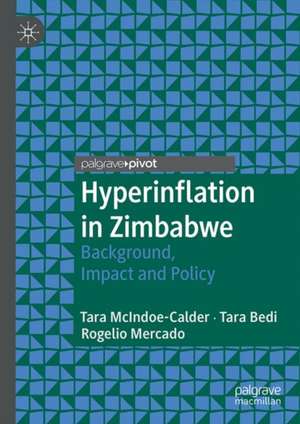Hyperinflation in Zimbabwe: Background, Impact, and Policy
Autor Tara McIndoe-Calder, Tara Bedi, Rogelio Mercadoen Limba Engleză Hardback – 27 noi 2019
Preț: 383.50 lei
Nou
Puncte Express: 575
Preț estimativ în valută:
73.39€ • 79.69$ • 61.65£
73.39€ • 79.69$ • 61.65£
Carte tipărită la comandă
Livrare economică 23 aprilie-07 mai
Preluare comenzi: 021 569.72.76
Specificații
ISBN-13: 9783030310141
ISBN-10: 3030310140
Pagini: 118
Ilustrații: XI, 118 p. 12 illus.
Dimensiuni: 148 x 210 mm
Greutate: 0.31 kg
Ediția:1st ed. 2019
Editura: Springer International Publishing
Colecția Palgrave Pivot
Locul publicării:Cham, Switzerland
ISBN-10: 3030310140
Pagini: 118
Ilustrații: XI, 118 p. 12 illus.
Dimensiuni: 148 x 210 mm
Greutate: 0.31 kg
Ediția:1st ed. 2019
Editura: Springer International Publishing
Colecția Palgrave Pivot
Locul publicării:Cham, Switzerland
Cuprins
1. Introduction.- 2. Hyperinflation in Zimbabwe.- 3. Historic Hyperinflation Episodes.- 4. Economics of Hyperinflation.- 5. Empirical Strategy.- 6. Data and a New Price Index.- 7.How is the Hyperinflation in Zimbabwe Different?.-8. Conclusion.
Notă biografică
Tara Bedi is a Marie Curie (CAROLINE) Irish Research Council Post Doctoral Fellow in the Economics Department at Trinity College Dublin. Prior to this, she worked with Trócaire, an Irish NGO, leading on policy research, including Leading Edge 2020. Before moving to Ireland, Tara worked in the Poverty Reduction Group at the World Bank, where she worked and published on impact evaluations, poverty maps and poverty monitoring systems. She received a master’s degree in Public Administration in International Development from the Harvard Kennedy School. She holds a PhD in Development Economics from Trinity College Dublin.
Tara McIndoe-Calder is a Senior Economist in the Irish Economic Analysis Division of the Central Bank of Ireland. She carries out research in the areas of household finance, consumption, income and wealth; labour markets; and SMEs. Prior to joining the Irish Economic Analysis Division she worked in the Financial Stability Division of the Central Bank of Ireland developing loan loss forecasting models for household and SME risk management in the Irish financial sector. Tara holds an MPhil from Oxford and a PhD from Trinity College Dublin. She is a Rhodes Scholar and a Trinity Scholar.
Rogelio Mercado is a Senior Economist at the Macroeconomics and Monetary Policy of the SEACEN Centre. He develops and delivers training courses on international macroeconomics and monetary policy to various central bank staffs in Asia. He is also the primary author and manager for the SEACEN Capital Flows Monitor. Prior to joining the SEACEN Centre, he held various research and teaching positions. Rogelio's area of research interests include international macroeconomics, international financial economics, and growth theory. He has a portfolio of research publications in international peer-reviewed journals and book chapters. He holds a PhD in Economics from the Trinity College Dublin.
Tara McIndoe-Calder is a Senior Economist in the Irish Economic Analysis Division of the Central Bank of Ireland. She carries out research in the areas of household finance, consumption, income and wealth; labour markets; and SMEs. Prior to joining the Irish Economic Analysis Division she worked in the Financial Stability Division of the Central Bank of Ireland developing loan loss forecasting models for household and SME risk management in the Irish financial sector. Tara holds an MPhil from Oxford and a PhD from Trinity College Dublin. She is a Rhodes Scholar and a Trinity Scholar.
Rogelio Mercado is a Senior Economist at the Macroeconomics and Monetary Policy of the SEACEN Centre. He develops and delivers training courses on international macroeconomics and monetary policy to various central bank staffs in Asia. He is also the primary author and manager for the SEACEN Capital Flows Monitor. Prior to joining the SEACEN Centre, he held various research and teaching positions. Rogelio's area of research interests include international macroeconomics, international financial economics, and growth theory. He has a portfolio of research publications in international peer-reviewed journals and book chapters. He holds a PhD in Economics from the Trinity College Dublin.
Textul de pe ultima copertă
This book investigates the hyperinflation in Zimbabwe in the 2000s. The authors present a full description of the Zimbabwean hyperinflation in its relevant economic, historical and political context. They address parallels with other hyperinflations, discuss the economics of hyperinflation in general and of the Zimbabwean hyperinflation in particular, and provide a money demand estimation using a new dataset. The study concludes with several policy lessons. This book will be of interest to researchers in both social sciences and the humanities, as well as practitioners and policy-makers in development economics, and those in the banking industry.
Caracteristici
Provides clear policy lessons Explores causes and effects of hyperinflations Considers a range of price data sources Written using case studies that will appeal to both an academic and policy-oriented audience
